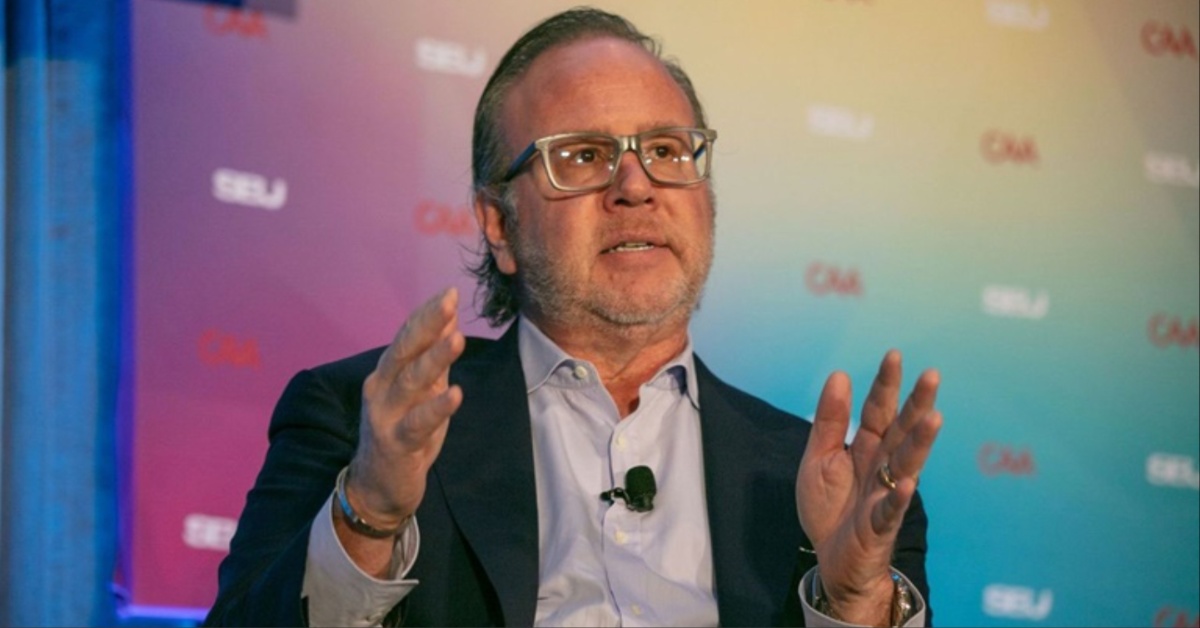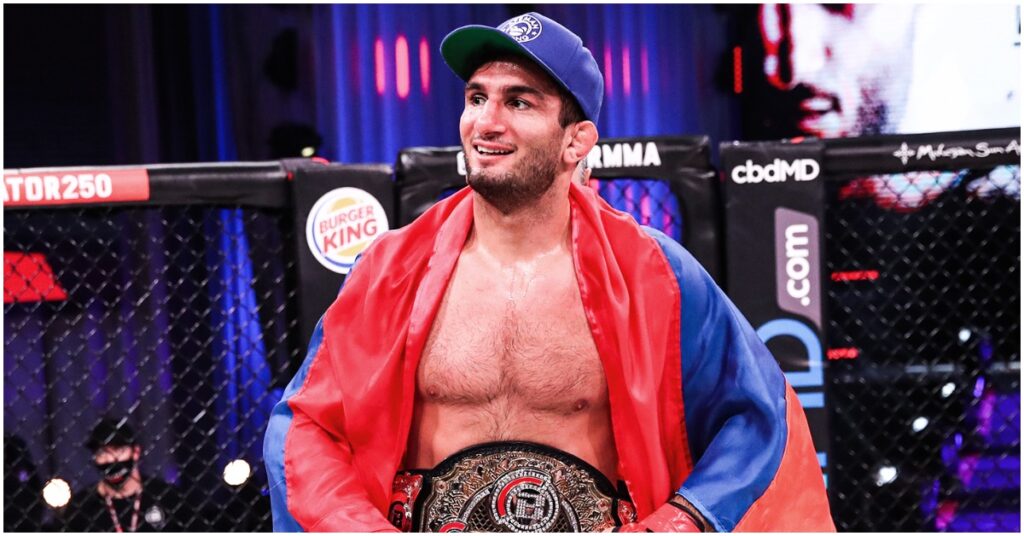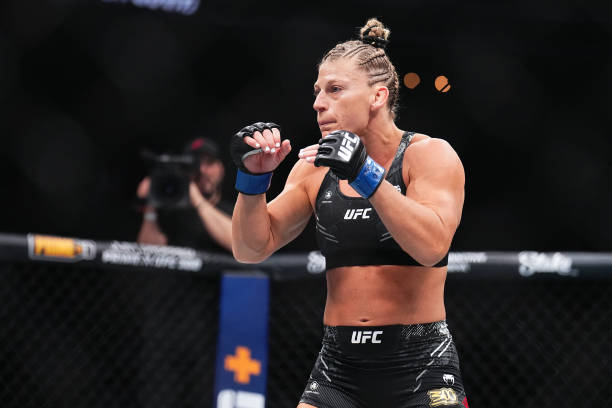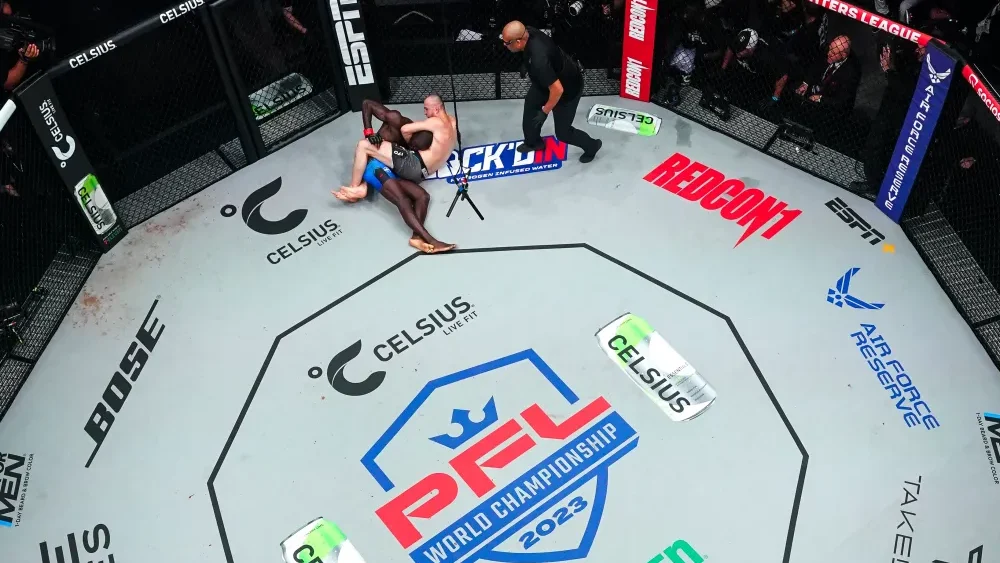Is PFL really ‘Fighter-First?’

For years, challenger MMA brand PFL has used a term to argue that they are not just a better product for you the viewer, but also for the talent who compete: “Fighter-first.” In an age where UFC has caught flack for underpaying talent, causing them to recently settle a pair of class action lawsuits to the combined tune of nine figures, PFL sees branding themselves as a more ethical alternative as something that could garner attention.
Of course, when people feel you fail to deliver on a promise that is loudly and publicly flaunted, they will proudly point out the irony that they see. In recent months, that’s exactly what has been happening. There have been numerous moments that have played out in the press, courts and social media where fighters or viewers have been critical of the “fighter-first” tagline. What qualms do people have, how could the issues have been dealt with differently, and do they truly counter the promotion’s often-used catchphrase? Let’s go over a few notable cases and discuss them.
A Game of Telephone: Communication Problems Amid Expansion

For the past few years, PFL has been a story of expansion. They went from a singular regular season tour to also hosting tournaments in Europe, the Middle East, and one-off events as well. Along with these shows, the promotion grew significantly when they purchased Bellator late last year, consuming their entire roster and deciding to keep the brand alive with a select series of events in 2024.
Since the purchase, numerous cases have sprung up that saw Bellator fighters struggle to communicate under their new bosses.
Just last week, former Bellator champ Gegard Mousasi was released by the PFL after a lengthy dispute that was in the public eye. Mousasi claimed that he was shunned by the company and unable to fight, as the promotion deemed his ongoing deal too expensive. PFL, for their part, denied this claim and said they previously offered Mousasi a fight that was declined.
Notable fighters Cris Cyborg and Douglas Lima have aired similar grievances about not being offered fights. In Cyborg’s case, she isn’t fighting despite the promotion saying that they want to position her against Larissa Pacheco. Just earlier this month, PFL said that they have plans for Lima and want him to fight, which goes against Lima’s claims of being “on the sidelines for a year now.”
Sabah Homasi, a Bellator fighter, claims that reimbursement for medical bills to the tune of $32,000 need to be paid out by the promotion. He, similarly to others, mentioned a struggle to properly communicate with the PFL over his issue. PFL countered, saying that former Bellator owner Paramount is the one who should be paying, and that they are trying to make them cover the bill instead.
All of these instances are he-said-she-said scenarios. There are two sides to each story, of course. Did Mousasi actually turn down a fight? What are the specifics of Cyborg and Lima’s issues? And who should Homasi truly be chasing down?
These are different issues, but there’s a trend to observe here: Numerous fighters who came from Bellator are voicing their opinion to the public after claiming they struggled to communicate with their boss. To hear this from many different fighters all around the same time seems concerning.
Of course, there is a lot to cover when you are purchasing a promotion the size of Bellator. PFL had to sift through a couple hundred contracts, not to mention the non-fighter staff that also have to be managed and placed into new roles. It’s not surprising that there are some awkward issues in this transitional period for many fighters just recently joining the promotion. Even though we don’t know the exact truth behind all of the recent disputes between fighters and the company, it’s alarming that they are all springing up around the same time.
PFL Obligations that don’t feel fighter-friendly
The devil is in the details, as they say. So much about being a promoter is dealing with the paperwork that makes the show actually run. Agreeing to terms with the fighters, venues, broadcasters, partners, and others is a necessary part of the job. Realistically, it’s hard to actually say how “fighter-first” PFL is unless we can get a glimpse of how they conduct business with their fighters. Luckily, the curtain was peeled back recently.
The promotion was open to a lot of scrutiny earlier this year when details from a lawsuit against them by fighter Manoel Sousa came out. Sousa, a Brazilian fighter who appeared on the promotion’s Challenger Series in early 2023, alleged that the promotion blocked him from taking a Dana White’s Contender Series booking later that same year. His qualm was that he believed he was a free agent and had only agreed to a one-fight deal with the PFL, but was instead still being pushed around by them.
Details revealed in the lawsuit provided a rare look at how PFL structures some of its deals. Most striking in this contract was that PFL puts in the option to extend a one-year deal two to three times, depending on circumstances. As shown in Erik Magraken’s piece published back in March using details from the lawsuit, PFL could extend a fighter for two more years—or seasons—after they complete their first full year. Under the circumstance that a fighter wins a title during the final year of their contract, they can extend it once again. When a fighter signs with the PFL they could be fighting for just a year, or the length of a U.S. Presidential term.

While the extensions were a striking part of the story, there was more to look at. Notably, the fact that PFL had a laundry list of ways they could freeze a fighter’s contract, including being able to stall an agreement if a fighter is “unable, unwilling and/or refuses to compete and/or train for any MMA bout(s) for any reason.”
Parts of these details sound, arguably, fighter last. UFC has been criticized in the past for having agreements that would extend a fighter’s contract by an extra year if they possess a championship in the promotion. This is why it took more than a year for Francis Ngannou to make any moves in combat sports after having his last UFC fight in early 2022.
You could argue whether or not what PFL does is better or worse compared to the lengthy contracts that its main competitor UFC has put together in the past, but that’s sort of missing the point. If you are doing a similar business tactic as the brand you battle against – a company that is constantly being scrutinized for being anything but “fighter-first” – how can you say that you are?
Matchmaking issues

In theory, PFL’s annual season format could provide some of the most fair, even opportunities for fighters. If you win your regular season fights—preferably via finish to earn as many points as possible—you’ll get put into their playoff bracket, and then you just need two more wins to take the championship. It takes everyone the same amount of time to work their way to a title, if they are successful. At face value, PFL is eliminating the politics of fighting and evening the playing field. But it’s not that simple.
Many people, including some inside the promotion, have accused PFL of unfair matchmaking that causes the season schedule to be much more intense for some players than others.
When PFL announced the second wave of regular season matchups for this year, some questioned the fights that were put together. Since the bouts were made following the promotion’s first three events this year, it meant that nearly everybody being booked had already competed once in the season.
At flyweight, five fighters walked away with wins following the first leg of the regular season: Taila Santos, Jena Bishop, Liz Carmouche, Kana Watanabe, and Dakota Ditcheva. Out of those five, four of them got paired up against each other. The fifth, Ditcheva, was given Chelsea Hackett, a six-fight pro who was stopped in the first round via armbar by Jena Bishop in April. Ditcheva was coming off a first-round finish from her first appearance of the season, where she was a massive -2500 favorite in some sportsbooks.
In other words, after receiving the easiest matchup on the first flyweight show, Ditcheva was given the easiest matchup of the second show. Bishop, one of the flyweights in the tournament, wasn’t a fan of the lineup: “Bruh!! The favoritism is unreal! The PFL is SHADY AF!!!!” she wrote on Instagram.
Daniel James, who competes in the promotion’s heavyweight division, released a similar statement about his weight class: “I think the PFL organization is showing a lot of favoritism for guys that they want to push,” he posted.
Lopsided regular season matchups benefit some, but not all fighters who compete for the promtoion.
A counter-point would be that most sports leagues don’t have fair scheduling. But, PFL isn’t most sports leagues. Unlike MLB’s 162 games, NBA’s 82 games, or even NFL’s 17 games, PFL’s regular season consists of just two fights, giving the bookings a heightened importance in the standings. It would be unfair to expect that they create five evenly-matched fights twice a year in their top divisions, sure. But there should at least be a stronger attempt to achieve fairness in matchmaking. The fights are a problem right now, so much so that you’re seeing some of the current athletes speak up about it.
‘Fighter-first’ is a good idea, but is it a reality?
Does PFL have examples where they were arguably giving some fighters great business opportunities? Absolutely. The signing of Francis Ngannou last year, which presented lucrative MMA matchups for both him and whoever he agrees to face, was championed by many, as was the fact that PFL would allow him to pursue mainstream boxing fights on the side which will earn him absurdly high paychecks.
In 2020, when PFL decided to take a pass on running their season format due to the COVID-19 pandemic, they allowed fighters to take bouts in other promotions. Their annual playoffs present paychecks in the six-figures, which is rare to find in MMA outside of the UFC, especially with Bellator needing to find a new home.
PFL has made moves in the past that have benefitted fighters. They have, in parts of their business, done things that you could say put fighters first. While it’s important to pay attention to moments that are critical of the promotion, this is not to say that they never do any good.
The title of “fighter-first” is broad and all-encompassing. It’s not “some fighters first,” or even “most fighters first.” Fighters, all of them, first. Of course, when running dozens of events a year and utilizing hundreds of fighters, there are lots of things at play all at once. And with a new share of talents joining their roster and a continued international expansion, PFL has more on their plate than ever before. But the vision of how to treat fighters that they have mentioned for years cannot be lost amid this growth if they value it.
Being a “fighter-first” promotion sounds great, especially since many would agree that MMA is a sport where the athletes deserve more. But as it stands right now, the tagline for PFL is hard to put a ton of weight on when seeing some of the complaints levied against them. PFL can make changes and certainly shouldn’t be discouraged from giving their fighters more benefits. For now, however, “fighter first” is more of a goal than it is an already attained accomplishment.






